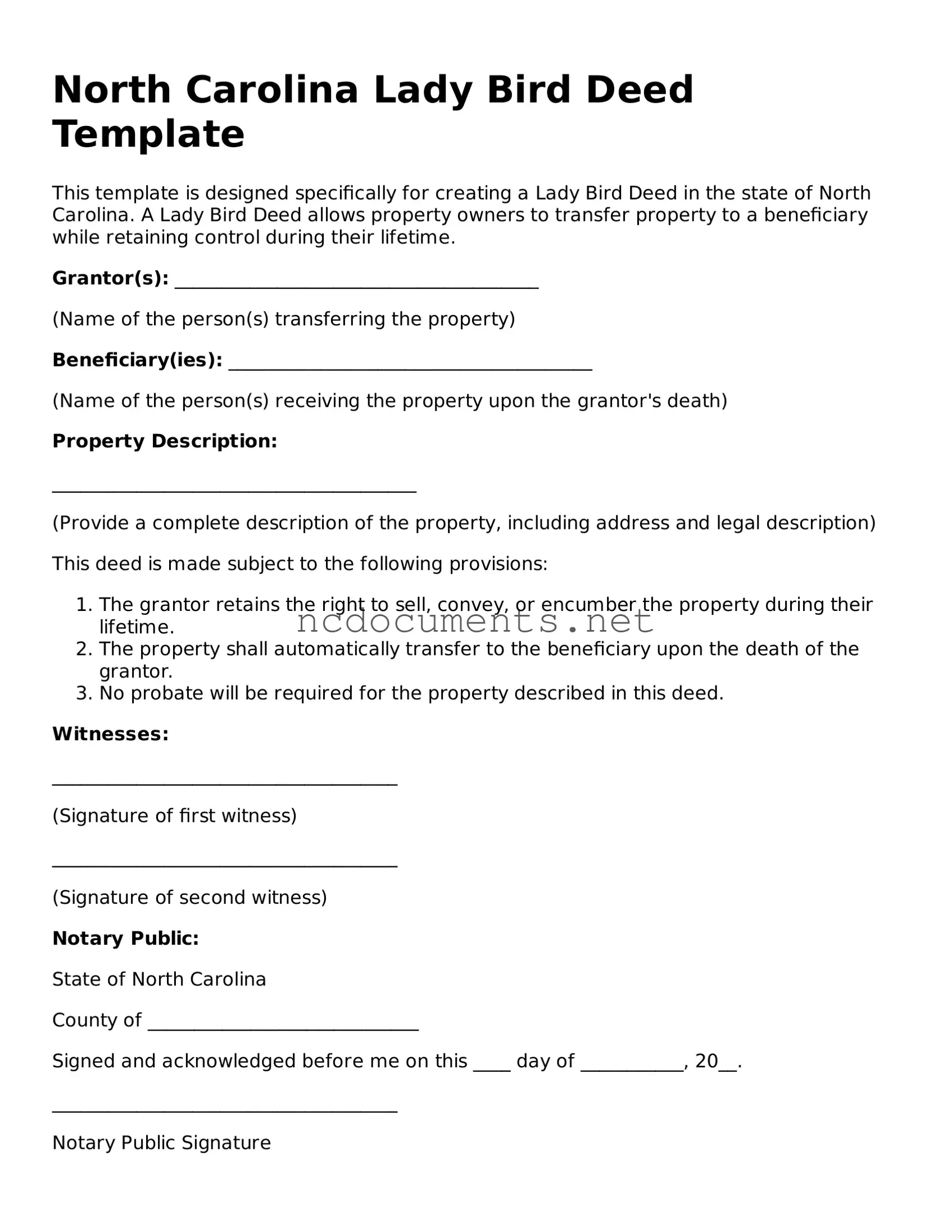The North Carolina Lady Bird Deed is similar to a traditional life estate deed. Both documents allow a property owner to retain certain rights while transferring ownership to another person upon their death. In a life estate deed, the original owner maintains the right to use the property during their lifetime, but they cannot sell or mortgage it without the consent of the remainderman. The Lady Bird Deed, however, allows for more flexibility, enabling the owner to sell or mortgage the property without needing consent, which can simplify estate planning.
Another document similar to the Lady Bird Deed is the transfer-on-death (TOD) deed. Like the Lady Bird Deed, a TOD deed allows property to pass directly to a beneficiary upon the owner's death, bypassing probate. This streamlined process can save time and reduce costs for heirs. However, unlike the Lady Bird Deed, the TOD deed does not allow the owner to retain the right to use or control the property during their lifetime, making it less flexible in certain situations.
The revocable living trust shares similarities with the Lady Bird Deed in that both can help avoid probate. A revocable living trust allows the property owner to place assets into a trust while retaining control over them during their lifetime. Upon death, the trust assets can be distributed to beneficiaries without going through probate. However, the Lady Bird Deed specifically addresses real property and allows for continued use by the owner, which is not a feature of a living trust.
A warranty deed is another document that resembles the Lady Bird Deed in terms of transferring property ownership. A warranty deed guarantees that the seller has clear title to the property and the right to sell it. While both deeds transfer ownership, the Lady Bird Deed includes the unique feature of allowing the original owner to retain control and use of the property during their lifetime, which a warranty deed does not provide.
The quitclaim deed is also comparable to the Lady Bird Deed, as both are used to transfer property interests. A quitclaim deed transfers whatever interest the grantor has in the property without any guarantees. While it can be useful for transferring property quickly, it does not provide the same lifetime rights or protections as the Lady Bird Deed, which maintains the original owner’s rights until death.
The enhanced life estate deed, often confused with the Lady Bird Deed, is another similar document. Both allow property owners to retain a life estate while designating beneficiaries to receive the property upon their death. However, the enhanced life estate deed does not allow the owner to sell or mortgage the property without the beneficiaries' consent, unlike the Lady Bird Deed, which offers greater flexibility.
The power of attorney document can also be likened to the Lady Bird Deed in terms of property management. A power of attorney grants someone the authority to act on behalf of another person in financial or legal matters, including property transactions. While it does not transfer ownership, it allows for control over property management. The Lady Bird Deed, on the other hand, ensures that property ownership is transferred upon death while allowing the owner to manage the property during their lifetime.
The general warranty deed is another document that shares characteristics with the Lady Bird Deed. Both documents facilitate the transfer of property ownership. However, a general warranty deed provides assurances regarding the title, ensuring the buyer that the property is free from claims. The Lady Bird Deed, while it transfers ownership, emphasizes the retention of rights by the original owner until death, which is not a feature of the general warranty deed.
The special warranty deed is similar to the Lady Bird Deed in that it also transfers property ownership but with limited warranties. The seller guarantees that they have not done anything to affect the title during their ownership. The Lady Bird Deed, however, focuses more on the retention of rights by the property owner, allowing them to maintain control and use of the property until their death.
For those seeking to understand the legal landscape of property documents, exploring essential features of a Notary Acknowledgement form can be invaluable. This form plays a critical role in authenticating signatures and identities in legal transactions, ensuring that documents are executed with integrity and trust.
Lastly, the beneficiary deed, which is recognized in some states, is akin to the Lady Bird Deed. Both documents allow property to pass to a designated beneficiary upon the owner’s death without going through probate. However, the Lady Bird Deed allows the original owner to retain control and use of the property during their lifetime, while a beneficiary deed does not provide such rights, making the Lady Bird Deed a more flexible option for estate planning.

